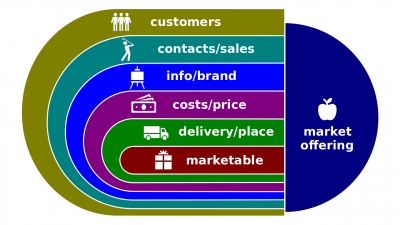Difference between revisions of "Service"
(→Related lectures) |
(→Definitions) |
||
| Line 10: | Line 10: | ||
:[[Service]] ([[business analysis]]). The performance of any duties or work for a stakeholder, from the perspective of the stakeholder. | :[[Service]] ([[business analysis]]). The performance of any duties or work for a stakeholder, from the perspective of the stakeholder. | ||
According to the [[ITIL Foundation 4e by Axelos]], | According to the [[ITIL Foundation 4e by Axelos]], | ||
| − | :[[Service]]. A means of enabling value co-creation by facilitating outcomes that customers want to achieve, without the customer having to manage specific costs and risks. | + | :[[Service]]. A means of enabling [[value co-creation]] by facilitating outcomes that customers want to achieve, without the customer having to manage specific costs and risks. |
==Related lectures== | ==Related lectures== | ||
Revision as of 13:38, 18 December 2020
Service is a marketable in a form of work carried out for or on behalf of others.
Definitions
According to Marketing Management by Keller and Kotler (15th edition),
- Service. Any act or performance that one party can offer to another that is essentially intangible and does not result in the ownership of anything.
According to Managing Quality by Foster (6th edition),
- Service. A mix of intangibles and tangibles that are delivered to the customer.
According to the BABOK Guide (3rd edition),
- Service (business analysis). The performance of any duties or work for a stakeholder, from the perspective of the stakeholder.
According to the ITIL Foundation 4e by Axelos,
- Service. A means of enabling value co-creation by facilitating outcomes that customers want to achieve, without the customer having to manage specific costs and risks.
